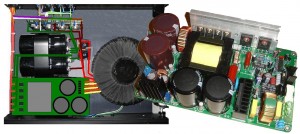We would like to invite you to the next research seminar of the Creative Technology Research Centre.
Title: Development of novel low noise Switch-mode power supply designs for high fidelity audio power amplifiers
Time: 2:00PM-3:00PM
Date: Wednesday 25 February 2015
Room: P335, Poole House, Talbot Campus
Abstract:
Nowadays, linear power supplies are widely used to provide the supply voltage rail to an audio amplifier and are considered bulky, inefficient and expensive due to the presence of various components. In particular, the typical requirements of linear designs call for physically large mains transformers, energy storage/filtering inductors and capacitors. This imposes a practical limit to the reduction of size and weight in audio power systems. In order to overcome these problems, Switch-mode Power Supplies (SMPS) incorporate high speed switching transistors that allow for much smaller power conversion and energy storage components to be employed. In addition the low power dissipation of the transistors in the saturated and off states results in higher efficiency, improved voltage regulation and excellent power factor ratings. However, the use of SMPS in audio amplification is not novel in itself, the contribution will arise from design optimisation to achieve the lowest possible harmonic distortion in the audio output stage. Therefore, the primary aim of this research project is to develop the novel low noise switch mode power supply for an audio power amplifier. It will also strive to elevate the reliability of SMPS through stability analysis and enhance the efficiency of power supply through high speed switching transistors. As a result, the research will aim towards changing the way industrial manufacturing of power supplies for audio amplifiers are carried out. It will also provide a new path for researchers in this field to utilize the SMPS in all other audio devices by further enhancing its efficiency and reducing system noise.
We hope to see you there.

 Urban Noise and Wellbeing – KIMA: Noise film screening + Q&A
Urban Noise and Wellbeing – KIMA: Noise film screening + Q&A










 Fourth INRC Symposium: From Clinical Applications to Neuro-Inspired Computation
Fourth INRC Symposium: From Clinical Applications to Neuro-Inspired Computation Writing policy briefs
Writing policy briefs Upholding Excellence: The Concordat to Support Research Integrity
Upholding Excellence: The Concordat to Support Research Integrity Today’s Documentation Will Serve Tomorrow’s Justice
Today’s Documentation Will Serve Tomorrow’s Justice ECR Funding Open Call: Research Culture & Community Grant – Application Deadline Friday 12 December
ECR Funding Open Call: Research Culture & Community Grant – Application Deadline Friday 12 December MSCA Postdoctoral Fellowships 2025 Call
MSCA Postdoctoral Fellowships 2025 Call ERC Advanced Grant 2025 Webinar
ERC Advanced Grant 2025 Webinar Horizon Europe Work Programme 2025 Published
Horizon Europe Work Programme 2025 Published Horizon Europe 2025 Work Programme pre-Published
Horizon Europe 2025 Work Programme pre-Published Update on UKRO services
Update on UKRO services European research project exploring use of ‘virtual twins’ to better manage metabolic associated fatty liver disease
European research project exploring use of ‘virtual twins’ to better manage metabolic associated fatty liver disease